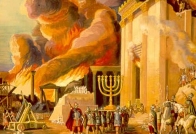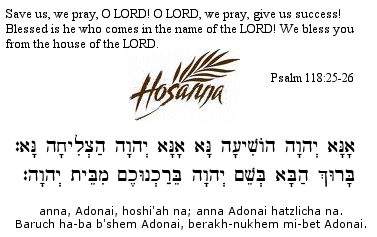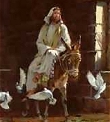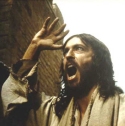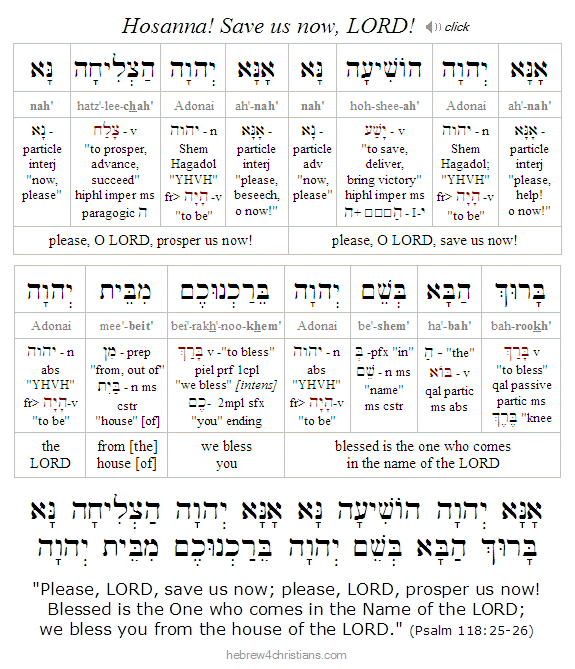|
|
|||||||||||||||||||||
 |
|||||||||||||||||||||
|
Learn Hebrew |
|||||||||||||||||||||
|
Why was the Temple Destroyed? |
||||||||||||||||
|
Sinat Chinam and Tishah B'Av |
||||||||||||||||
|
Tishah B'Av remembers the destruction of the two Holy Temples of Judaism. According to the Talmud (Yoma 9b), the first Temple was destroyed (586 BC) because of the sins of idolatry, immorality, and bloodshed, but the Second Temple was destroyed (70 AD) because of what the sages call "baseless hatred." This baseless hatred (called sinat chinam) is considered a more serious offence than the earlier sins that led to the destruction of the First Temple: It took 70 years to rebuild the First Temple, but Jews are still waiting to rebuild the Second Temple, even after more than 1,900 years.... Why was the first Sanctuary destroyed? Because of three [evil] things which prevailed there: idolatry, immorality, bloodshed. But why was the second Sanctuary destroyed, seeing that in its time they were occupying themselves with Torah, [observance of] precepts, and the practice of charity? Because therein prevailed hatred without cause. That teaches you that groundless hatred is considered as of even gravity with the three sins of idolatry, immorality, and bloodshed together. (Talmud: Yoma 9b) Though sinat chinam (ū®ūéų┤ūĀų░ūÉųĘū¬ ūŚų┤ūĀų╝ųĖūØ) is often translated as "baseless hatred," it literally means "hatred of grace (ūŚųĄū¤, chen)," that is, an aversion to using ayin tovah (a good eye) to see good in others. Just as God freely loves, so the devil freely hates... In essence, then, sinat chinam is the rejection of God's grace. But since Yeshua is the embodiment of all of God's grace (John 1:17, etc.), sinat chinam is ultimately a rejection of His ministry... Is it any wonder, then, that our Lord foretold the destruction of the Second Temple based on Israel's hatred and rejection of Him (Matt. 24:2)? Matthew notes that hoshiah na was addressed to Yeshua Himself, "to the [greater] son of David" (ū£ų░ūæųČū¤ųŠūōų╝ųĖūĢų┤ūō), thereby indicating that the Messianic Hope was presented to Israel (Matt. 21:9). For a flickering moment the proper praise was given to Yeshua as Mashiach ben David, though of course He had come to them as Mashiach ben Yosef, their Suffering Servant, the One of whom the prophet Isaiah clearly foretold. Immediately after his "triumphal entry," Yeshua went directly to the Temple and drove out all who sold there, overturning the tables of the "money changers" and the seats of those who sold pigeons (Matt. 21:12). After this the blind and the lame were able to enter the Temple -- and Yeshua healed them. After Yeshua ended his denunciation, he lamented for Jerusalem: O Jerusalem, Jerusalem, the city that kills the prophets and stones those who are sent to it! How often would I have gathered your children together as a hen gathers her brood under her wings, and you would not! See, your house is left to you desolate. For I tell you, you will not see me again, until you say, 'Blessed is he who comes in the name of the Lord' (ūæų╝ū©ūĢų╝ūÜų░ ūöūæų╝ūÉ ūæų╝ū®ūüūØ ūÖūöūĢūö). - Matt. 23:37-39 After this, Yeshua left the Temple for good and never looked back. In Matthew 24 Yeshua's disciples made a last-ditch appeal for Jewish tradition and ceremony by pointing out the glory of the Second Temple. "Look at these beautiful buildings of the Temple, Lord..." It was then that Yeshua pronounced judgment on the Temple and the Levitical system, predicted the Roman destruction of the Temple, and so on (Matt. 24:1-2). This was apparently unfathomable to the disciples, who apparently still considered Yeshua to be a "reformer" of Temple Judaism, perhaps the one who would restore it so that the Kingdom of God would be finally manifest upon the earth. Yeshua went on to explain the signs of the End of the Age (ūÉųĘūŚų▓ū©ų┤ūÖū¬ ūöųĘūÖų╝ųĖū×ų┤ūÖūØ) that would precede the promised Days of Messiah (ūÖų░ū×ųĄūÖ ūöųĘū×ų╝ųĖū®ūüų┤ūÖūŚųĘ), otherwise known as the Messianic Kingdom. He foretold that one day praise would rightly be given to Him as Israel's True King, but only after the travail of the coming Great Tribulation upon the earth. Only after the Jewish people cry out to Him as their LORD (Matt. 23:39) would the Kingdom of God be established in Zion. And they come to Jerusalem: and Jesus went into the temple, and began to cast out them that sold and bought in the temple, and overthrew the tables of the moneychangers, and the seats of them that sold doves; And would not suffer that any man should carry any vessel through the temple. And he taught, saying unto them, Is it not written, My house shall be called of all nations the house of prayer? but ye have made it a den of thieves. And the scribes and chief priests heard it, and sought how they might destroy him: for they feared him, because all the people was astonished at his doctrine. And when even was come, he went out of the city. Yeshua certainly knew the Temple and its supposed beauty. He razed it because Israel forsook His greater sacrifice. The Jewish sages had it half right. It was indeed because of sinat chinam that the Second Temple was destroyed, but this was most clearly revealed in the rejection of Yeshua as Israel's King and Savior....
|
||||||||||||||||
|
Hebrew for Christians |
||||||||||||||||
|
||||||||||||||||
